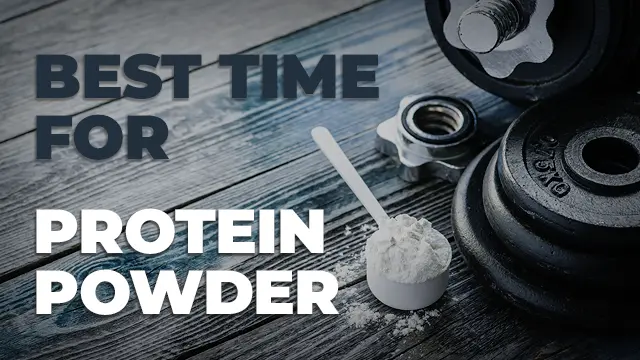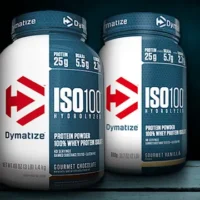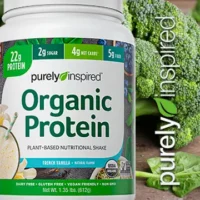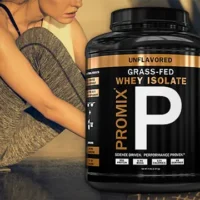BACK
The best time to take Protein Powder
The body is surprisingly good at storing and using amino acids when it needs them, but timing can be helpful depending on your goal.

There are several different theories on how to best take a protein supplement. There’s first thing in the morning, before a workout, after a workout, and before bed, and that’s just some suggestions.
What it really comes down to is what your health and fitness goal is. The body is surprisingly good at storing and using amino acids when it needs them, so timing your protein intake is all about maximizing digestion and absorption.
What it really comes down to is what your health and fitness goal is. The body is surprisingly good at storing and using amino acids when it needs them, so timing your protein intake is all about maximizing digestion and absorption.
FIRST THING IN THE MORNING
Protein is thought to reduce your appetite and stabilize your blood sugar levels, as does fiber. Taking protein with or before breakfast can help to reduce portion sizes, which can be very useful if you’re aiming to lose weight.
Drinking a protein shake first thing is also a good idea if you tend to workout in the mornings. General advice is to wait at least an hour between your shake and exercise, and those amino acids should be hard at work providing energy for your workout.
Drinking a protein shake first thing is also a good idea if you tend to workout in the mornings. General advice is to wait at least an hour between your shake and exercise, and those amino acids should be hard at work providing energy for your workout.
IN-BETWEEN MEALS
Just like drinking your shake first thing in the morning, using protein as a snack replacement can reduce your cravings for sweeter treats.
By reaching for a protein snack instead of a chocolate bar, you can reach your weight loss goals more effectively and ensure you’re reaching your protein goals easily.
By reaching for a protein snack instead of a chocolate bar, you can reach your weight loss goals more effectively and ensure you’re reaching your protein goals easily.
BEFORE A WORKOUT
Drinking your protein shake before a workout is meant to provide extra energy for your muscles during training and prevent muscle breakdown.
The studies done on this haven’t conclusively proven that this is effective, and it seems more important that you consume sufficient protein, rather than specifically timing when you take it.
The studies done on this haven’t conclusively proven that this is effective, and it seems more important that you consume sufficient protein, rather than specifically timing when you take it.
AFTER A WORKOUT
The theory behind taking protein after a workout relates to the micro muscle tears caused during exercise. Strength training in particular requires protein to repair the muscle, which in turn creates muscle growth.
Known as the “anabolic window”, the common protocol is to consume a protein drink within 20-30 minutes of completing exercise, as this is when the body is most likely to soak it up. In addition, it has been shown there is increased skeletal muscle blood flow shortly after a workout enabling a higher transport of protein-building amino acids directly to muscles.
There isn’t a large amount of research in this area. As long as you’re consuming enough protein for your training needs, your body will have the amino acids needed for muscle repair and growth.
Known as the “anabolic window”, the common protocol is to consume a protein drink within 20-30 minutes of completing exercise, as this is when the body is most likely to soak it up. In addition, it has been shown there is increased skeletal muscle blood flow shortly after a workout enabling a higher transport of protein-building amino acids directly to muscles.
There isn’t a large amount of research in this area. As long as you’re consuming enough protein for your training needs, your body will have the amino acids needed for muscle repair and growth.
BEFORE BED
Similar to taking protein after a workout, drinking your shake before bed is based on the idea that your body repairs muscle more effectively during sleep. Of course, protein is required to repair muscle, and so it makes sense to supplement just before rest.
We would also suggest looking at casein protein powder as an ideal pre-sleep option. Its peptide and micelle structure is disturbed by the acid in your stomach and this causes the casein to form a gelatinous structure which slows the digestion process. This means that rather than flooding your body with essential amino acids, it forms a steady flow of amino acids over a far longer period of up to 7 hours. While this may not be useful after a workout, it makes casein ideal for its anti-catabolic effect while sleeping.
There are a couple of question marks over this idea, the first being how well you might sleep when you’re digesting - as is required before you can start repairs. The second issue is how much your bladder can hold, and if the answer is “not much”, then you’d best steer clear of this late-night snack unless you’re up for a midnight trip to the bathroom!
We would also suggest looking at casein protein powder as an ideal pre-sleep option. Its peptide and micelle structure is disturbed by the acid in your stomach and this causes the casein to form a gelatinous structure which slows the digestion process. This means that rather than flooding your body with essential amino acids, it forms a steady flow of amino acids over a far longer period of up to 7 hours. While this may not be useful after a workout, it makes casein ideal for its anti-catabolic effect while sleeping.
There are a couple of question marks over this idea, the first being how well you might sleep when you’re digesting - as is required before you can start repairs. The second issue is how much your bladder can hold, and if the answer is “not much”, then you’d best steer clear of this late-night snack unless you’re up for a midnight trip to the bathroom!
SO, WHAT’S THE ANSWER?
It rather depends on your goal and lifestyle.
If you’re aiming to lose weight, then protein in the mornings and between meals seems like a sensible option, especially if it helps reduce cravings for unhealthy snacks.
For gym-junkies, it largely depends on the type of protein you use and timing your protein for availability when your body is recovering from a workout.
If you’re aiming to lose weight, then protein in the mornings and between meals seems like a sensible option, especially if it helps reduce cravings for unhealthy snacks.
For gym-junkies, it largely depends on the type of protein you use and timing your protein for availability when your body is recovering from a workout.
Popular Reviews
The content on this site has not been written, reviewed or endorsed by a medical professional. We assume no liability for the misuse of supplements and recommend you review the label of any product, as well as consulting with your health care professional.
We are a participant in the Amazon Services LLC Associates Program, an affiliate advertising program designed to provide a means for us to earn fees by linking to Amazon.com and affiliated sites.
We are a participant in the Amazon Services LLC Associates Program, an affiliate advertising program designed to provide a means for us to earn fees by linking to Amazon.com and affiliated sites.
© 2026 ProteinPowder.com




